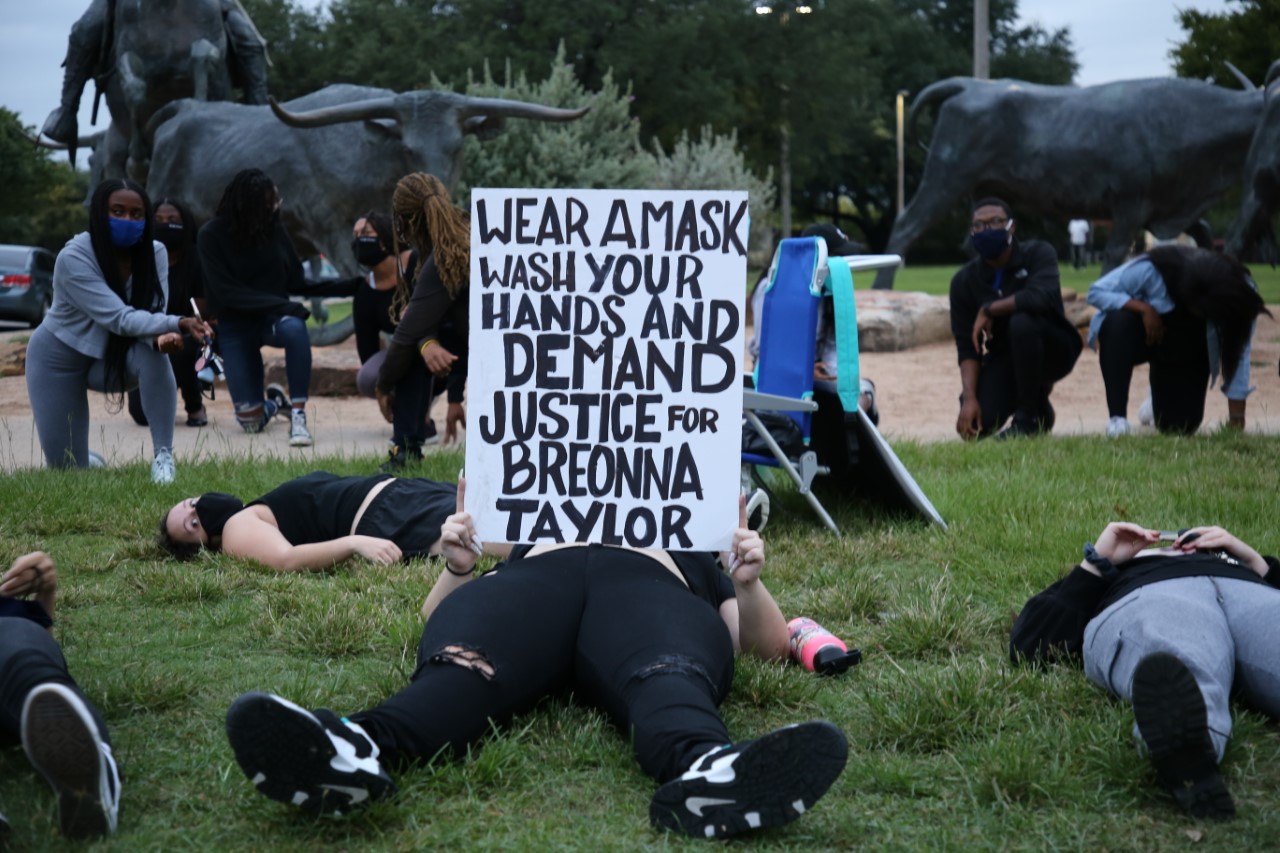Little St. Louis coverage of U.S. attorney’s role in helping Trump rewrite history
St. Louisans may be surprised to hear it, but their U.S. Attorney Jeff Jensen had a lead role in recommending that Michael Flynn be cleared of lying to the FBI – even though Flynn had been convicted and twice admitted the crime in open court.
The Flynn dismissal is a key element of President Donald Trump’s attempt to rewrite the history of the Russian investigation. Trump is trying to sell the American people a phony scandal – he calls it “Obamagate” – in which Special Counsel Robert Mueller’s investigation was a Deep State plot to unseat a duly elected president.
As important as Jensen’s role was in whitewashing the Flynn case, his activity hasn’t received much attention from St. Louis media, with the exception of Ray Hartmann’s coverage in the Riverfront Times. Hartmann calls Jensen the “stealth fighter” who manages to escape unscathed from scandals that could hurt his reputation.
In a Facebook post last week, Hartmann pointed out that the Post-Dispatch failed to cover Jensen’s role with its own reporters, but at the same time published a Jensen op-ed warning that prisoners shouldn’t receive a “get-out-of-jail-free card” because of the Covid pandemic.
It’s ironic, Hartmann wrote, that, “After failing to cover our hometown US Attorney Jeff Jensen’s central role in a historic ‘get-out-of-jail-free card’ national mission on behalf of Gen. Michael Flynn during pandemic–one that just prompted more than 2,000 former FBI and DOJ officials to demand resignation of Atty Gen William Barr–our hometown St. Louis Post-Dispatch just published a hometown op-ed from Mr. Jensen headlined ‘Criminals must not receive a get-out-of-jail-free card during pandemic.’”
Gilbert Bailon, Post-Dispatch editor, noted in response that paper had published an Associated Press story on Jensen’s role on May 7.
Unprecedented DOJ surrender
Legal experts say the Barr-Jensen effort to clear Flynn is unprecedented and rests on an extraordinarily weak legal argument. The effort is so transparently political that it threatens the rule of law, they say.
Never before has there been a case in which the government moved to withdraw a conviction where there was no admission of prosecutorial wrongdoing or claim that the defendant’s constitutional rights rights were violated and where the defendant has admitted to the crime twice in open court, while represented by one of the country’s silk stocking law firms.
Brandon Van Grack, the prosecutor who had worked on the case for two years, withdrew from it the day the DOJ filed a motion to dismiss the charge to which Flynn had pleaded guilty. Not one line prosecutor in the Department of Justice signed on to the brief.
Attorney General Barr said he based his decision on Jensen’s review of the case. Jensen said in a DOJ release: “Through the course of my review of General Flynn’s case, I concluded the proper and just course was to dismiss the case. I briefed Attorney General Barr on my findings, advised him on these conclusions, and he agreed.”
Veteran prosecutors with bipartisan credentials say that the government’s legal position is shockingly wrong.
Former U.S. Attorney and top FBI official Chuck Rosenberg said on a Lawfare podcast: “I’ve never seen anything like it…the reasoning is completely vacuous. You could imagine a situation in which the government generally believes in good faith that the prosecutors did something wrong or there wasn’t a material lie or that there was a procedural flaw.

“But the brief filed….was just made up. It didn’t accurately state what happened and then the misstatements in the pleading were material, the characterization of Flynn’s lies as immaterial were laughable, and the so-called procedural flaws…don’t matter at all.”
Rosenberg and Lawfare executive editor Susan Hennessey said they could not think of any explanation “other than that the attorney general, apparently assisted by the U.S. Attorney in Missouri, is trying to align the Justice Department with the prejudices, instincts and rantings of the president.”
“The Attorney General has been on a systematic campaign to undermine and discredit the Mueller investigation and the Mueller report,” Hennessey said. “We’ve seen him attempt to do that through the John Durham review, we have seen him do that by intervening in Roger Stone’s sentencing recommendations, we’ve seen it now with dropping the charges against Mike Flynn. So this is part of an ongoing campaign….
“There is no question this is politically motivated…and this is about..protecting the president’s political cronies and also offering the president a cudgel to go after his enemies by rewriting history to somehow suggest that nobody did anything wrong even when they admitted to criminal conduct and instead this was just a Deep State plot to go after the president.”
Plenty of predication
One absurd claim in the Flynn filing is that there isn’t enough evidence to prove the charges in court beyond a reasonable doubt, the lawyers said. But the filing failed to mention Flynn has pleaded guilty in court twice and that his statements during those plea hearings can be used against him.
The central argument the Justice Department, led by U.S. Attorney General William P. Barr, makes in its new filing is that there wasn’t a sufficient “predicate” for an investigation of Flynn. In other words, there wasn’t enough evidence to even start an investigation. Justice Department guidelines require there be a factual basis to believe that a crime or national security threat exists–a very low bar.
Barbara McQuade, a professor at Michigan Law School and former U.S. Attorney in Michigan, says, “This argument not only lacks merit—it also opens the door to the same frivolous argument from future defendants in other criminal cases. And it creates a dangerous incentive that could dissuade the FBI from fulfilling its duty to fully investigate criminal and national security threats.”
The Justice Department began its investigation of Flynn during 2016 because he had travelled to Russia, received $40,000 from government-controlled Russia Today, and dined next to Vladimir Putin. The Justice Department’s nonpartisan inspector general reviewed this decision and agreed the FBI had enough of a predicate to start the investigation.
But by January, 2017 the FBI had not collected much additional information and had prepared a memo to close the inquiry. Before closing the case, the FBI learned Flynn had spoken to Russian Ambassador Sergey Kislyak in late December 2016. By that time Flynn had been designated as the future national security adviser. In the call to Kislyak, Flynn asked Russia not to retaliate for the sanctions Obama had imposed for Russian interference in the 2016 presidential election to help Trump win. “We’ll review everything,” Flynn assured the Russian ambassador.
In other words, don’t respond to the sanctions of the sitting American president because we’re about to take over and may change the sanctions.
A few days later Flynn lied to Vice President-elect Mike Pence about the conversation, saying he hadn’t discussed sanctions. Based on that assurance, Pence made public statements on Jan. 17 saying the Obama sanctions had not been discussed with the Russians.
The events alarmed the Justice Department, which feared Flynn was now vulnerable to Russian blackmail. The FBI decided to keep the Flynn investigation open and interviewed Flynn who lied about talking to Kislyak about sanctions.
The Barr Justice Department now insists that with the initial investigation on the verge of being closed, there needed to be a new predication for an investigation, and that the discovery of the Flynn-Kislyak call was not sufficient. With the initial predication lapsing and the new one insufficient, Flynn’s false statements to the FBI did not involve a fact “material” to an ongoing investigation – because neither the earlier or later investigation had a sufficient predicate to continue.
But McQuade, Rosenberg and many former prosecutors disagree. “There is no need for a new predication for the interview – because it had already been properly predicated, as found by the inspector general,” says McQuade.
“Even if new predication were somehow required, the content of Flynn’s calls, along with his apparent lies to Pence, provided a sufficient factual basis for further inquiry,” she added.
Rosenberg agrees. “You don’t need to reassess predication every day,” he says. “If it (the initial investigation) had been closed, all you have to do is open it up again.” He also points out it is impossible to claim Flynn didn’t lie about a “material” fact when the president himself fired him for it.
The Barr Justice Department brief also mentions “newly discovered information” that Jensen found of discussions within the FBI about how to approach the Flynn interview – whether to warn him at the outset that lying to the FBI is a crime or to wait until he has lied. Barr calls this a “perjury trap,” but most former prosecutors say discussions about how to approach an interview are common.
It’s uncertain how this will end. U.S. District Judge Emmet Sullivan, known for his independence, named a retired New York federal judge John Gleeson to oppose the Justice Department’s attempt to kill the conviction. Depending how the courts act, the case could still be live during the next president’s administration.
In the meantime, Fox News has reported that Jensen is now helping U.S. Attorney John Durham with the larger review Barr has ordered of the Russian investigation. Stay turned in the fall campaign for President Trump and his legal puppets in the Justice Department to expand on their fictional account of how Mueller’s Russian investigation was a hoax.
Barr did seem to set an outer boundary on Monday to how far he is willing to go with this legal charade. He said he didn’t expect Durham to investigate Obama or Vice President Joseph Biden, even though Trump has said recently that Obama and Biden “should be going to jail” for crimes, which might even include “treason.”
Earlier this month Barr was asked by CBS how he thinks history will judge his decision on Flynn. “Well, history is written by the winners,” he said, “so it largely depends on who’s writing the history.”
And that depends in part on how thoroughly reported the first draft of history is for the voters making their decision in November.
William H. Freivogel is the publisher of Gateway Journalism Review. He covered the Justice Department for the Post-Dispatch in the 1980s.
Related Posts

Another side of protests: Small peaceful gathering in Waco

‘When you get between your readers and a liar, the liar loses’
